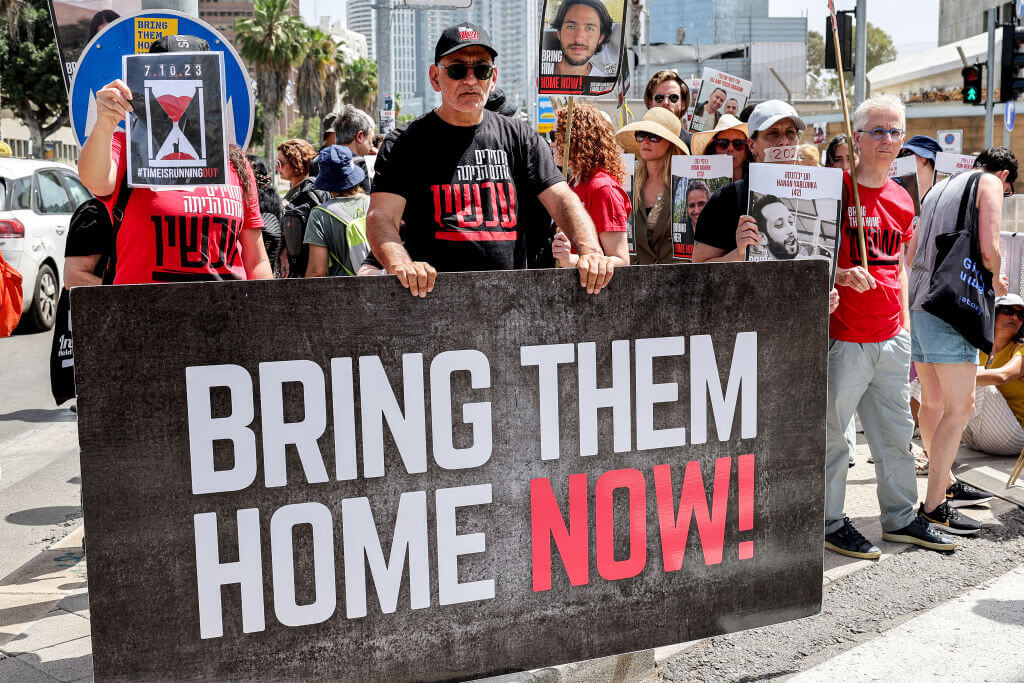Argentine-Israeli hostage Lior Rudaeff is declared dead as number of hostages known to be living dwindles
The announcement came as Rudaeff’s cousin was on her way to an Argentinean government event to call for the Israeli hostages’ release

Friends and family of the Israeli hostages held in Gaza protest outside the Defense Ministry headquarters in Tel Aviv on April 25. Photo by Getty Images
BUENOS AIRES (JTA) — Lior Rudaeff’s cousin was on the way to an event in Argentina’s parliament to demand his release from Hamas captivity when she got the news: The Israeli army had determined that Rudaeff, 61, had died on Oct. 7, and that his body had been held hostage by Hamas for the last seven months.
The news came amid mounting revelations that of the roughly 130 hostages held since Hamas’ Oct. 7 attack on Israel, more than had previously been known are likely to be dead. Before this month, the Israeli army had notified the families of 35 hostages that their loved ones had been determined to be dead.
In the last week, three additional hostages have been announced to have died on Oct. 7: Rudaeff; Dror Or, a father from Kibbutz Beeri whose wife was also killed; and Elyakim Libman, who had been working security at the Nova music festival where hundreds of young people were murdered.
Additionally, Hamas has repeatedly scaled back expectations about how many living hostages it can release in the event of a ceasefire deal. This week, the terror group announced unilaterally that it had agreed to a deal that Israel said was different from what had been on offer; one key difference was that Hamas said it wanted to include dead hostages in the first 33 released. Already, Israel had softened its demands after coming to understand that there were not 40 living hostages in the first categories eligible for release under any deal: women and children, elderly men and the sick and injured.
The revelations come as tense negotiations toward a mutual deal are ongoing, and as Israel carries out what it says is a limited invasion of Rafah, a southern Gaza city packed with refugees that Israel says is Hamas’ last stronghold.
Many in Israel and abroad are calling for Israeli Prime Minister Benjamin Netanyahu to strike a deal to end the fighting and bring home the hostages. In Argentina, politicians from multiple parties, Jewish leaders and the Israeli ambassador, Eyal Sela, all participated in the parliamentary event Tuesday to call for the release of the hostages.
They carried photos of the Argentine-Israelis who remain hostages: Shiri and Yarden Bibas and their sons Ariel and Kfir, David Cunio, Ariel Cunio, Eitan Horn, Iair Horn and Rudaeff.
Micaela Rudaeff canceled her participation in the meeting after learning of her cousin’s death but sent a message.
“It’s been 214 days since Lior has been dead,” she said. “It is difficult to understand what the families of those kidnapped are experiencing. All the kidnapped people have to return to their homes now, healthy, safe and alive. Lior is not coming back alive.”
Lior Rudaeff moved to Israel from Argentina with his family when he was 7. An ambulance driver and volunteer medical services provider, he was a father of four and grandfather of two. He was kidnapped from Kibbutz Nir Yitzhak, a community with many Argentine citizens, after telling his family he had been hurt while fighting Hamas attackers. Five others were killed on the kibbutz on Oct. 7 and five others, all Argentine-Israelis, were released during a brief ceasefire in November.
This article originally appeared on JTA.org.
A message from our CEO & publisher Rachel Fishman Feddersen
I hope you appreciated this article. Before you go, I’d like to ask you to please support the Forward’s award-winning, nonprofit journalism during this critical time.
We’ve set a goal to raise $260,000 by December 31. That’s an ambitious goal, but one that will give us the resources we need to invest in the high quality news, opinion, analysis and cultural coverage that isn’t available anywhere else.
If you feel inspired to make an impact, now is the time to give something back. Join us as a member at your most generous level.
— Rachel Fishman Feddersen, Publisher and CEO